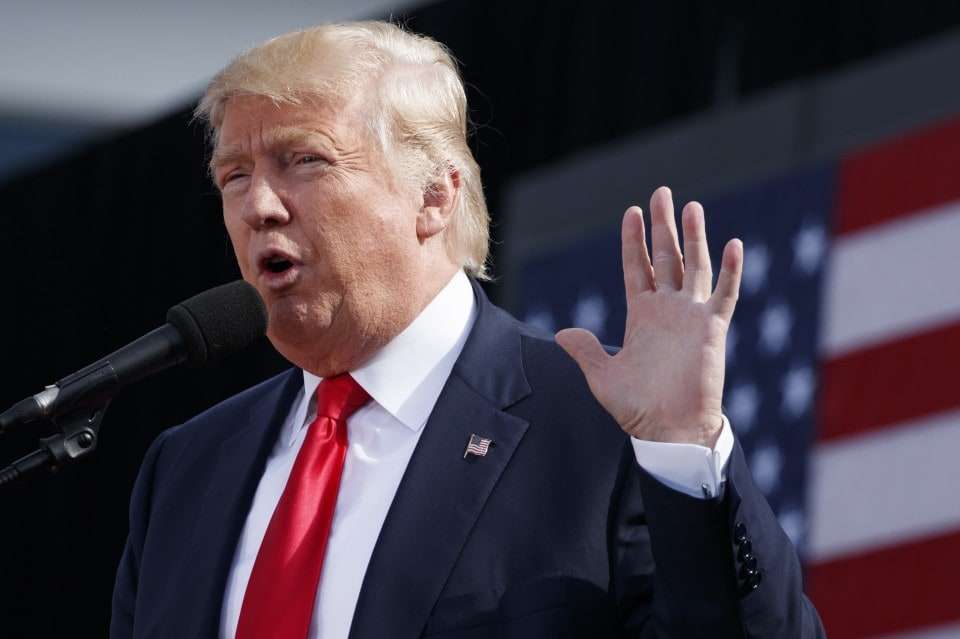The Volokh Conspiracy
Mostly law professors | Sometimes contrarian | Often libertarian | Always independent
Why I can't join the condemnation of Trump's allegedly anti-Semitic ad

I can't think of any good reason Donald Trump hasn't denounced the overt anti-Semitism of some of his fervent supporters, or the online bullying and threatening of Jewish critics. Nevertheless, there seems scant evidence that Trump is personally anti-Semitic, and some to the contrary. Many fervent anti-Semites seem to adore Trump, but he hasn't returned the favor.
Not everyone agrees, however, that the Trump campaign isn't intentionally stoking anti-Semitism. The Post's Dana Milbank, reflecting widespread criticism in progressive circles, writes:
On Friday, [Trump] released a closing ad for his campaign repeating offending lines from that speech, this time illustrated with images of prominent Jews: financier George Soros (accompanying the words "those who control the levers of power"), Fed Chair Janet Yellen (with the words "global special interests") and Goldman Sachs CEO Lloyd Blankfein (following the "global power structure" quote). The ad shows Hillary Clinton and says she partners "with these people who don't have your good in mind."
I watched the ad when I first heard of the controversy, and while I can't logically rule out the possibility that someone intentionally chose to obliquely satisfy their anti-Semitic urges by including Yellen et al. in the ad, I found it hard to credit Milbank's claim that the ad shows that "anti-Semitism is no longer an undertone of Trump's campaign. It's the melody." Indeed, I doubt I would have noticed any potential anti-Semitic implications of the ad at all, had I not been alerted to them.
First, and in contrast to almost every article I've read about the ad, suggesting that Jews were somehow featured, the Jews in the ad only appear for a total of about four seconds in a two-minute ad. Second, only Yellen and Soros are identified by name. I doubt 1 in 20 voters even knows who Yellen is, much less her ethnic background. Moreover, neither has a recognizably Jewish name - if you were going for the anti-Semitic vote, why not use Clinton supporters far more well-known and identifiably Jewish, such as Steven Spielberg, Joe Lieberman, or even Sarah Silverman? I didn't know Yellen is Jewish. Third, Lloyd Blankfein is pictured, but not identified by name. How many voters would recognize Blankfein? I didn't. And how many of those know he's Jewish? Again, I didn't.
One Facebook friend suggested that the ad wasn't meant to appeal to the run-of-the-mill anti-Semite who doesn't know Yellen from a hole in the head, but to the hardcore white-supremacist types who keep track of important Jews and would even recognize Blankfein. But why waste your campaign's money with appeals to a group that likely numbers in the tens of thousands when there are literally millions of undecided voters still at large?
Even more puzzling, why would you attack Jewish bankers to appeal to the best-informed segment of white supremacist extremists the same weekend you float the name of a Jewish banker, Steven Mnuchin, formerly of Blankfein's Goldman Sachs, as a possible Treasury secretary? Are the white supremacists supposed to be smart enough recognize Blankfein as a Jew, but not smart enough to know Mnuchin is a Jewish name, or to Google him?
Of course, you might instead focus on this campaign ad, the focus of which is attacking Wall Street in general and the obviously Jewish-sounding Goldman Sachs in particular for "rigging" American politics.
Oops! That's a Bernie Sanders ad. Nor was this an anomaly, as Sanders's attacks on "a handful of people on Wall Street [who] have extraordinary power over the economic and political life of our country" were a mainstay of his campaign. While I disagree with the accusation in both instances, I can see the case that both Sanders's and Trump's ads played to varying degrees to latent anti-Semitic sentiment. I can't, however, understand how any political commentator, or "defense" organization such as the ADL, could call out Trump's alleged anti-Semitic ad after having been completely silent about Sanders's consistent attacks on Wall Street, Goldman Sachs and, in fact, Blankfein in particular. And yet if anyone influential who is now criticizing Trump also criticized Sanders for similar sins, I haven't been able to find it. Which makes one suspect that one's priors about Trump and Sanders are playing more of a role here than the objective content of their ads.
As readers know, I despise Donald Trump. His campaign has often appealed to the worst instincts of the electorate. I hate to even write this post, lest it be seen as supportive of Trump. But judging by my Facebook feed, wildly exaggerated/double-standard criticism of Trump tempts a lot of reluctant conservatives to vote for Trump, as it reminds them of the unfairness all non-progressive politicians face from the establishment. So I think it's worth noting that there is no contradiction between being a NeverTrumper, and finding certain specific criticisms of Trump, including the one at issue here, to be exaggerated at best.
DISCLOSURE: I'm voting for Gary Johnson.


Show Comments (0)